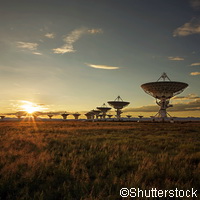Ball rolling for EU-Africa science capacity building: SKA dual-host site announced
Radio astronomy stakeholders from both Europe and Africa met in Brussels, Belgium to discuss funding opportunities for science on 29 May. In the same week, it was revealed that two of the three Square Kilometre Array (SKA) radio telescope receiver components are set to be built in southern Africa. The long and eagerly awaited SKA Site Advisory Committee (SSAC) decision follows nine years of work by site bid teams from the southern African region as well as from Australia and New Zealand. Based on an objective technical and scientific assessment of both potential sites, the SSAC decided that Africa was best placed to house the SKA, which will be about 50 to 100 times more sensitive than any other radio telescope currently in operation. However, Australia is not completely left out - the SKA organisation is constructing one of the three SKA receiver components there too. South Africa, along with its eight SKA partner countries in Africa (Botswana, Ghana, Kenya, Madagascar, Mauritius, Mozambique, Namibia and Zambia) will host the other two: a mid-frequency dish array and dense aperture array. Although the decision to split the SKA over multiple bid-sites is an unexpected one - from the outset the search was for a single site - using sites in both southern Africa and in Australia reflects the high level of work carried out by both bid teams. Radio astronomy is recognised as one of the disciplines with the most exciting potential for building Africa's science and technology capacities, and is also an area of great strategic importance for the future of research in Europe. It is with this in mind that a cross-party group of Members of the European Parliament (MEPs) began championing the strengthening of African-European radio astronomy partnerships, by backing the South African SKA bid and tabling the 'Written Declaration on Science Capacity Building in Africa: promoting European-African radio astronomy partnerships', which was adopted in March 2012. Five MEPs championed Written Declaration 45/2011: Polish MEP Filip Kaczmarek from the European People's Party (EPP); Miguel Angel Martínez Martínez and Teresa Riera Madurell, both Spanish MEPs from the Group of the Progressive Alliance of Socialists & Democrats (S&D); British MEP Fiona Hall from the Alliance of Liberals and Democrats for Europe (ALDE); and Dutch MEP Judith Sargentini from the Greens/European Free Alliance Group. The aim of the 29 May Brussels workshop was to follow on from the adoption of the Written Declaration and present funding opportunities for African-European radio astronomy partnerships. Members of the European Parliament, European Commission and European Investment Bank officials, and leading African and European radio astronomers and global industry representatives came together to discuss how to further develop cooperation in radio astronomy between Africa and Europe. The meeting ended with a discussion on next steps needed to fully establish a dedicated African-European Radio Astronomy Platform (AERAP) to enhance cooperation. The AERAP will provide a framework for stakeholders from the scientific community, industry and academia on both continents to initiate cooperation initiatives across the wide range of scientific disciplines and technological areas that will be essential for the future of radio astronomy in both Africa and Europe. Its overall goals will be to leverage cooperation in radio astronomy as an instrument to advance scientific discovery, to improve knowledge transfer and education, and to promote development and competitiveness in Africa and Europe Speaking at the workshop, Professor Luis Magalhães, co-chair of the Africa-EU Science, Information Society and Space Partnership Joint Expert Group, said: 'Cooperation in radio astronomy is very interesting for Europe and Africa. It involves science, technology and communication aspects. It is relevant in regard to the Africa-EU Partnership on Science, Information Society and Space, as it touches all its components. It has important economic and social benefits in the mutual interest of both continents.'For more information, please visit: SKA: http://www.skatelescope.org/ African-European Radio Astronomy Platform (AERAP): http://www.aerap.org/
Countries
Australia, New Zealand, South Africa

